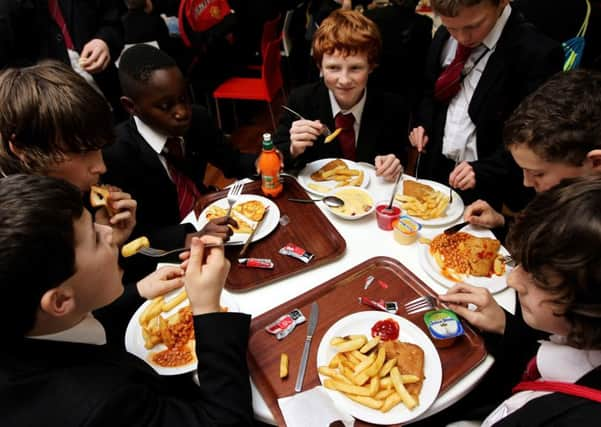NATIONAL: '˜Messy eating can help build a love of food'


New guidance from the National Institute for Health and Care Excellence said families should encourage ‘relaxed and enjoyable’ mealtimes.
Eating together as a family could also help.
The health body issued new guidance on the recognition and management of slow weight gain in infants and children, also known as faltering growth.
Advertisement
Hide AdAdvertisement
Hide AdAccording to the guidance, where there are concerns about faltering growth, GPs and health visitors can talk to an infant or child’s parents or carers about: encouraging relaxed and enjoyable feeding and mealtimes; eating together as a family or with other children; encouraging young children to feed themselves; allowing young children to be ‘messy’ with their food; making sure feeds and mealtimes are not too brief or too long and establishing regular eating schedules such as three meals and two snacks a day.
Parents should also be advised that drinking too many energy-dense drinks, including milk, can reduce a child’s appetite for other foods.
According to data collected from primary schools in England as part of the National Child Measurement Programme, in 2015/16, 1% of children starting school were underweight.
The guidance states that ‘simple interventions’ can increase nutritional intake and may be effective in improving weight gain
Advertisement
Hide AdAdvertisement
Hide AdThe cause of faltering growth can be difficult to determine as there may be a range of contributing factors.
Dietitian Dr Frankie Phillips, of the British Dietetic Association, said: ‘Whilst it is very worrying that so many children are showing faltering growth, we are also seeing far too many children with excessive weight gain.
‘Developing a healthy positive relationship with food can help both conditions and this goes beyond the scope of food as a vehicle for nutrition.
‘Getting hands on with food - whether that is using food for messy play, experimenting with new textures and tastes and helping with food preparation - can all help to achieve a love of good food and the social experiences that help to make up an enjoyable mealtime.
Advertisement
Hide AdAdvertisement
Hide Ad‘So often mealtimes can become a stressful battleground and it’s important to remove the stress.
‘Family mealtimes should be positive and relaxed times but crucially, the key to family nutrition nirvana means parents need to be good role models helping children to learn to enjoy a wide range of foods by doing so themselves.’
Professor Mary Fewtrell, nutrition lead at the Royal College of Paediatrics and Child Health, added: ‘Mealtimes can be an ordeal for families - particularly if there’s a child who is underweight and a fussy eater.
‘Things like making mealtimes as relaxed as possible, trying not to get into a battle over food and giving children as much choice as possible can all help.
Advertisement
Hide AdAdvertisement
Hide Ad‘If children find mealtimes fun from a young age, they’re less likely to be fussy later on. For very young children, this can be simple things like allowing them to feel the different textures of food - which can get messy.
‘In general, children won’t let themselves go hungry, however if you are concerned about your child’s growth you should always seek advice. The new Nice guideline provides guidance to help healthcare professionals identify when a child’s growth is a cause for concern requiring further investigation.’